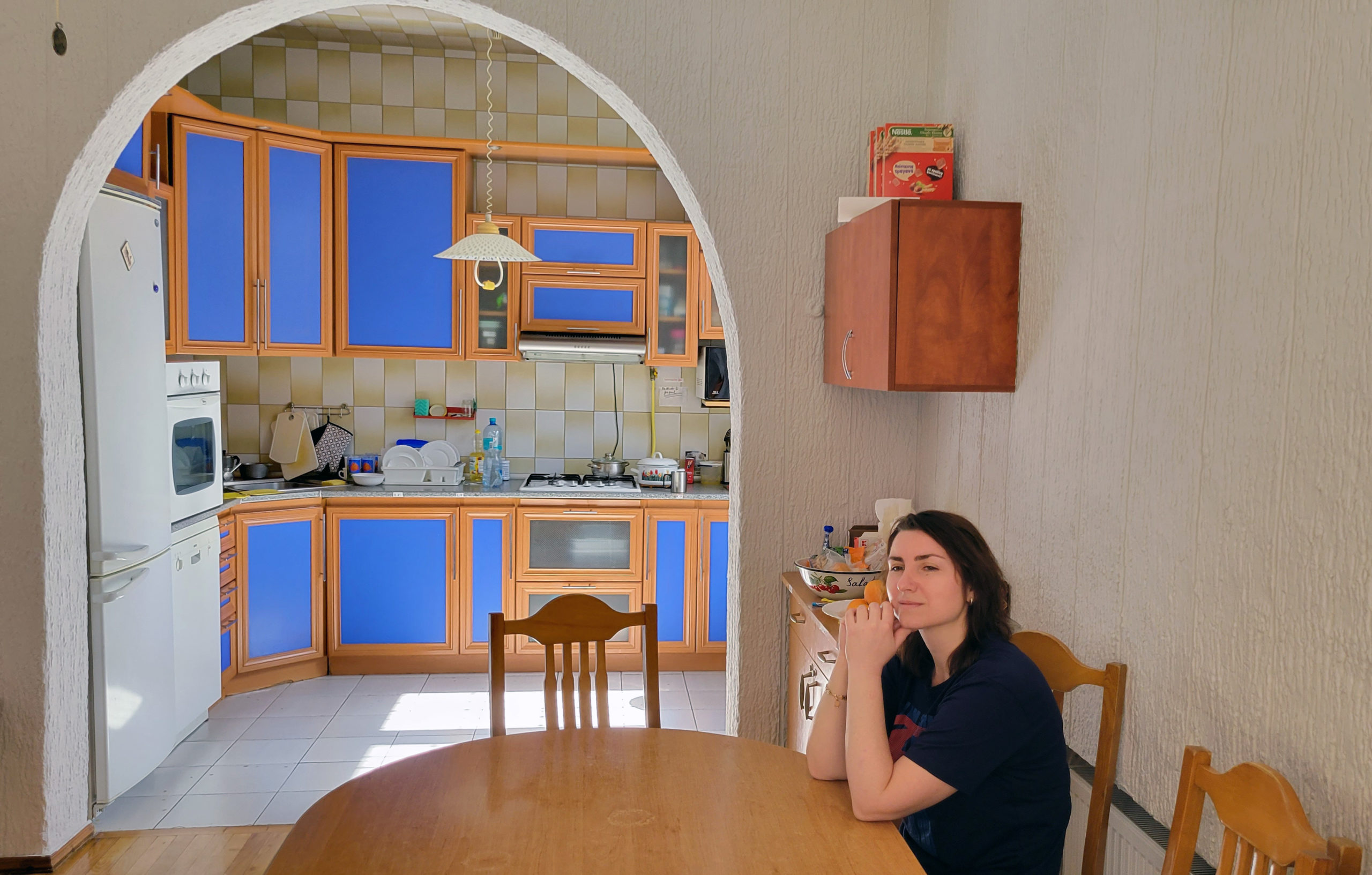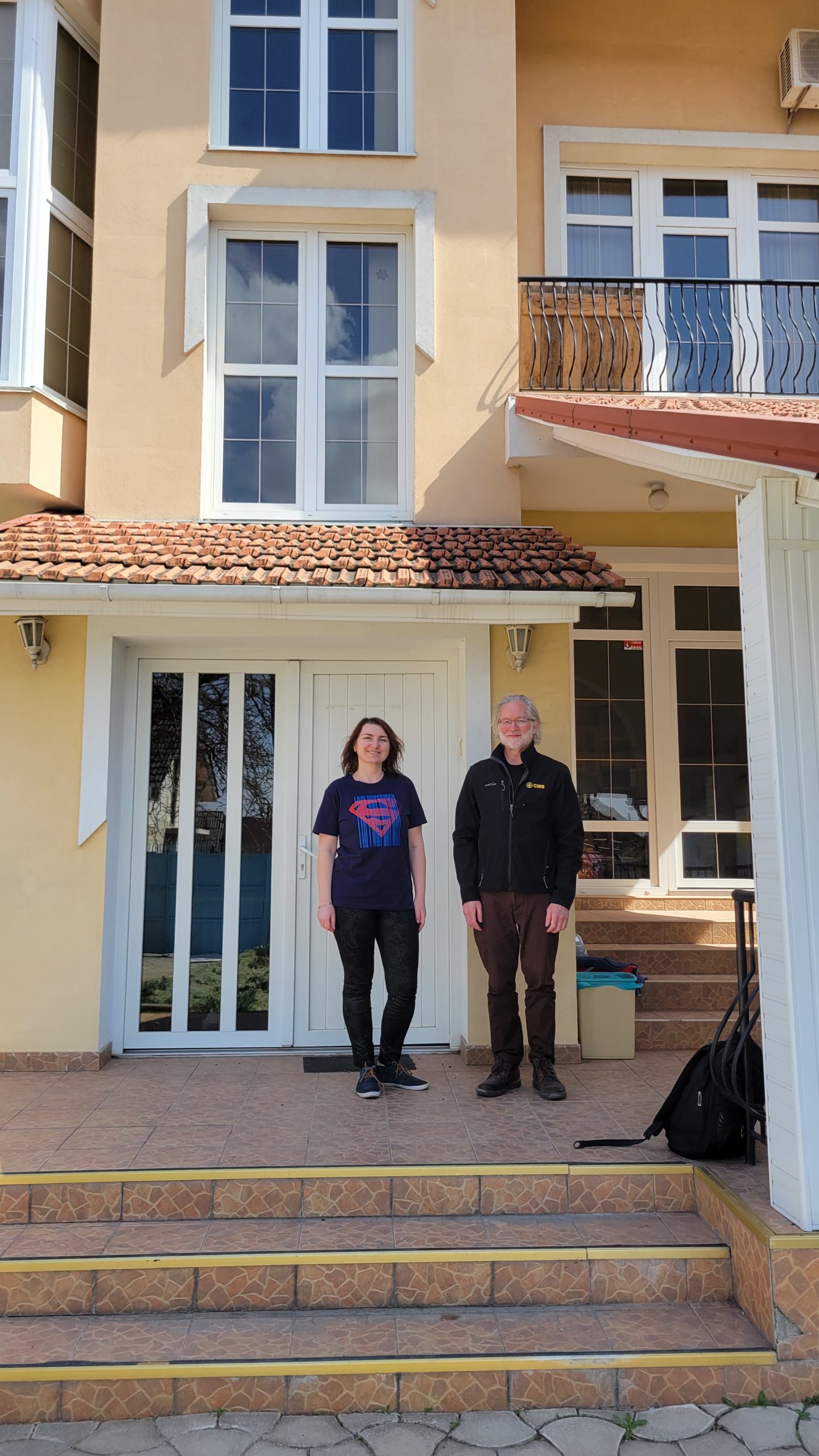
Viktoriia sits in the dining area in Diaconia’s shelter for Ukrainian refugees. She is from Odessa and is staying in the shelter with her 13-year-old son.
For years, the Moldovan organization called Diaconia has offered programs to support their neighbors. They have a bus called the LudoBus (in English, that roughly means “Play Bus”) that brings educational games to children across the country. In 2020, they started the nation’s first food bank. More recently, they have built a daycare center that was meant to open this month for babies and children.
When the war in the next door nation of Ukraine started, Diaconia pivoted their programs to help. CWS is supporting several parts of their work–more on that at the end of this story!
The Play Bus now visits refugee centers, bringing games and school supplies to refugee children while the team’s psychologist checks in with their parents. The food bank has swelled into a logistics hub that distributes food and hygiene products to local organizations and refugee centers. And that daycare center? It’s now a shelter that can host up to 20 Ukrainian refugees at a time.
When we visited the shelter, Ana from the Diaconia team told us, “We were planning to open it in April. When the war in Ukraine started and the first refugees arrived here, Diaconia made the decision to transform it into a refugee shelter. Now, at this moment, there are 14 people accommodated here, but the number keeps changing. The capacity of the house is 20 adults and children.”
Viktoriia is one of the Ukrainian refugees staying at the Diaconia shelter. She’s there with her 13-year-old son, whose t-shirt she was wearing when we talked to her. She explained that when they left their home in Odessa, it was winter. She only brought winter clothes, so she didn’t have anything to wear when warmer spring weather started in Moldova’s capital of Chișinău. Her son had a slightly different approach to packing when they fled Odessa. Viktoriia told us that he started packing a bunch of t-shirts. “We are not going on vacation,” she reminded him. “We are refugees.” Because of their rush to leave, neither mother nor son really have proper clothes with them.

Viktoriia stands with Steve Weaver, CWS Regional Director for Europe and the Middle East, outside the Diaconia shelter.
Viktoriia and her family have lived in Odessa since 2014, when they were displaced from Luhansk in eastern Ukraine due to war with Russia. Just last year Viktoriia and her husband bought their first home, an apartment, since they left Luhansk. “Odessa for me is home,” she says. “All my thoughts are about how I can go home and help my family.”
“My son is begging me to go home,” Viktoriia says. When we talked to her, she had just extended her stay by another week. She had talked to her contacts in Odessa who told her that it wasn’t yet safe to return home. So despite her son’s pleas, they are staying in Chișinău for an extra week.
Both Viktoriia and her son are finding ways to stay busy as they wait. Viktoriia has an herb garden growing in the front yard of the shelter. “I grew up in a village. I feel like I am drawn to the land,” she explained. Meanwhile, her son is volunteering in the food warehouse that Diaconia operates, making food packages for other Ukrainian refugees.
Thankfully, Viktoriia and her son have a comfortable shelter to stay in until it’s safe for them to go home. “Not taking into consideration what is happening in Ukraine, I can say that here I feel at home. I’m not joking when I say that even here I eat more than I did back in Ukraine because everything we ask for is brought to us. We have everything we need, all the food we need, all the hygiene supplies. Without considering the situation in Ukraine, this place is a wonderful place to rest, even enjoy a holiday,” Viktoriia says. “We really appreciate all the help that Diaconia has given us.” (She did want to be very clear that she was praising how the Diaconia team was providing all of the supplies and food that she needed, not saying that she lacked food in Ukraine.)
Across Moldova, ordinary citizens are showing extraordinary generosity in solidarity with the Ukrianians who have arrived in the last few weeks. “Even though we are the poorest country in Europe, we also have a cultural link with Ukrainians,” Ana explained. The vast majority of Ukrainian refugees in Moldova are staying in private homes with families. Their hosts expected to have guests for maybe a week. A month and a half later, they are still hosting refugees.
CWS is doing what we can to bolster this heroic effort by our Moldovan neighbors. We’ve provided funding to pay the gas and electric bills of Diaconia’s shelter—where Viktoriia and her son are living–for a couple months. We’ve funded school supplies for hundreds of Ukrainian refugee children, which the volunteers on the Play Bus are distributing. We also funded the purchase of a forklift for the food bank so that the Diaconia team can better manage their expanded operations. We’re still nailing down the details of our long-term response, but we’ve identified Diaconia and another Moldovan organization as our partners on the ground. We value the local perspective and expertise that these organizations bring, and we’re proud to work alongside them to provide the best possible care to Ukrainian refugees in Moldova.
Learn more and support our Ukraine response by clicking here.
